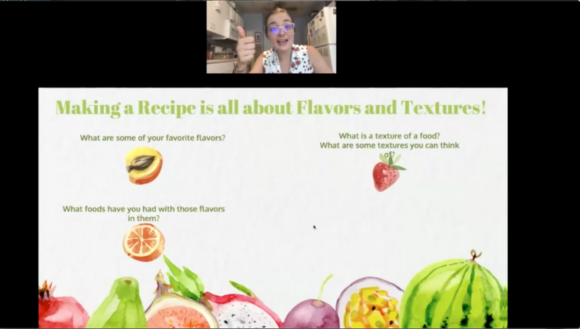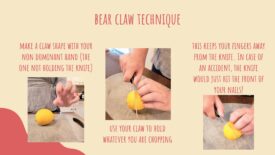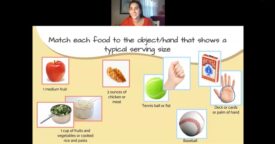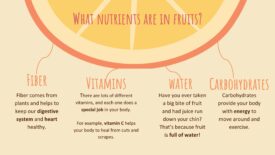If family meals for today’s busy families could be summed up in a word, it might be “convenience.” How fast the food gets from the freezer to the microwave to the table shapes the awareness children have of what they eat. On the other hand, “food literacy” is a life skill that reveals the elements of how food grows, nourishes our bodies, and enhances our lives. On that premise, the New Jersey Healthy Kids Initiative (NJHKI) at the New Jersey Institute for Food, Nutrition, and Health (IFNH) is guiding third through fifth graders on a food literacy journey that gets them thinking outside the microwaved meal box.
NJHKI launched “Grow. Prepare. Eat.”—a free virtual food literacy program offered during Summer 2020. For this pilot program, 50 participants are engaging in a six-week virtual food literacy class to learn about the source of their food, the process that food goes through from seed to plate, and how to choose, prepare, and enjoy healthy, safe, and tasty meals and snacks. The program has two main components: twelve 30-minute live/recorded lessons covering a wide variety of food literacy topics; and post-class hands-on activities that parent/guardians and children complete together.
The program began when Abigail Daniel, a masters of public health candidate at Rutgers School of Public Health, approached the NJHKI team about doing a food literacy program for kids as part of her practicum hours. NJHKI had already conducted such activities in the Culture of Health Academy kitchen at IFNH for the Scarlet Kids summer camp program at Rutgers, so the infrastructure already was in place. When honors student Gabriela Harrison, a nutritional sciences major at Rutgers School of Environmental and Biological Sciences, joined the effort–they were ready to roll.
And then COVID-19 happened. What was going to be hands-on cooking and gardening at IFNH—like the massive shift of education in the U.S and around the world—had to be converted to an online format. While presenting obvious challenges, the move to a virtual platform also opened-up new possibilities. Enrollment no longer needed to be limited to children local to the Rutgers—New Brunswick campus, but expanded to all of New Jersey. The online application could be used as a model and replicated. Hence, the project morphed into a pilot research project. With funding support from a Robert Wood Johnson Foundation grant and Wholesome Wave, a national organization addressing nutrition insecurity for low-income Americans, the program would be able to reimburse participating families for purchasing their own materials for the cooking and gardening activities.
The NJHKI team set to work developing an online platform, activities and lessons, and IT that would protect the children’s identities as part of the research project. Webex and ClassDojo platforms were used so instructors Daniel and Harrison could present live lessons to the kids, which also were recorded for later access. While children’s names and faces remained concealed, they could engage verbally during the lessons and through a chat platform.
Topics covered the essentials of three key areas—culinary (e.g., exploring flavors and textures; learning knife skills), nutrition (e.g., fruits, vegetables, proteins and grains; nutrition labels; measuring) and food systems (e.g., plant growth; low carbon food choices; managing resources). Students and parents reacted enthusiastically to activities that entailed taste testing, seed planting, and a household hunt for food labels to read.
“While we were developing lessons, participant engagement was the goal,” said Harrison. “We have included discussions, games, and hands-on activities to close the virtual distance between us and ultimately get participants excited about topics in food literacy.”
The engagement has worked, as Peggy Policastro, NJHKI culinary literacy and nutrition director notes, “I have been pleasantly surprised by the level of participation we are seeing in class. When we ask questions, the chat is filled with ideas or children raise their hands to unmute themselves and speak.”
Another benefit of the online format is for the kids to show their accomplishments from home. “Participants can actually bring us into their gardens and show us new seedlings just beginning to break through the dirt or the beginnings of a compost,” said Policastro. “At the end of class the other day we had participants stick around to take us on a tour of their gardens—which is something that could never happen during in-person learning.”
Are parents convinced this online program is effective? One could say, the “proof is in the pudding,” or in this case—the baked apple. A message from a parent on ClassDojo about one of the at home hands-on activities relayed, “I got home from work today and I asked my son how his first class was. He said it was ok as he excitedly told me about making baked apples. He wanted to make it tonight for dessert. He did! He did most of the steps including cutting the apple and doing the measurements. He served it to all of us. He was so proud and happy! Which makes me sooo happy! After we ate his “very first creation” (as he calls it), he asked us to “score” it according to taste.”
Daniel’s experience conducting the lessons affirms, “This program offers a very unique opportunity to the participants: a fun, engaging and age-appropriate virtual setting to learn about some of the major components of food literacy including the journey food goes on from seed to plate, flavor exploration and recipe building, and an introduction to healthy eating and nutrition. Through this program, our participants can explore these incredibly important and foundational concepts, while remaining safely at home!”
As the summer sessions conclude, the pilot project will provide research results to serve as a model program. Erin Comollo, NJHKI program development administrator, said, “I think this program’s value extends beyond its content on food literacy and will contribute to the needed and growing body of literature regarding best practices in virtual instruction. It is important to ensure that the virtual instructional approaches that so many educators are pivoting toward remain engaging and encourage actual life experiences despite being on-screen.”





